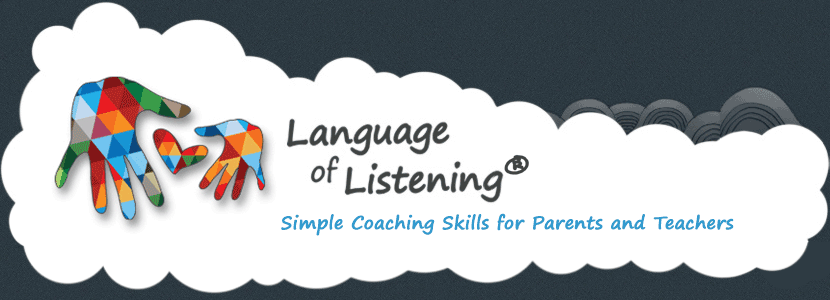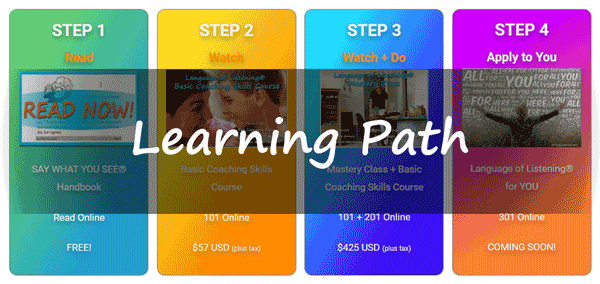It’s been great having my two daughters, Colleen (26) and Betsy (24) home for the summer. They are always in and out, but when they are in, they are really in and “present”… and so am I.
We have great conversations. Even our complaint sessions end up with validation and often deep heart-to-heart breakthrough processing moments. That’s just how we live—thank you, Language of Listening®!
One of the gifts of having meaningful conversations with your grown children is that you all share some inherited beliefs or ways of seeing the world. Examples would be seeing the world as either your natural home or inhospitable, welcoming or judgmental, abundant or defined by scarcity. Each world view comes with its own set of strategies for survival that get passed down from generation to generation.
It makes sense to me that it would work this way. After all, why wouldn’t parents pass on their survival strategies to their kids? Of course they would, whether they like the strategies or not.
Strategies for survival in a fear-based world generally show up as urgent “life lessons” that no one really likes. Those are the ones that my daughters and I process when they come to light because we believe that love, not fear, is the true source of everything.
One we uncovered recently is our fear-based belief about exclusion. This one can be touchy if you have it, too, so watch for your own reaction as you read this. But a great thing about processing your beliefs with family members is that when one of you gains insight or breaks through, the others do, too!
Our life lesson about exclusion is that “You HAVE TO include people or it hurts them.” Can you hear the fear in that strategy? We don’t like this life lesson, so we started looking for the source. As usual, what we found were two concepts that were in effect collapsed: “exclusion = rejection.” It turns out that in our family, we cannot tell the two apart.
Now granted exclusion and feelings of rejection can occur at the same time. That is actually probably how they became associated in our minds; but collapsing two concepts is different than just seeing concurrences or experiencing associations. The two are the same, not just sometimes, but always. In effect, they become one thing.
When you become aware that you’ve collapsed two concepts, at that very moment they begin to pop apart.
Upon further examination, you will find that one usually has a more physical world or experiential aspect and the other is more abstract. In this case, exclusion is more physical and action-based (something you can actually see), while rejection is more abstract and shows up as a feeling in reaction to a meaning you assign to the act of exclusion.
True collapses are usually so complete that they remain invisible until challenged—in our case, that means that even if exclusion occurred somewhere in our lives without rejection, we simply wouldn’t see it.
One of my favorite ways to challenge a collapsed association is to find an exception that will blow a hole in the idea that the two are always the same. So here’s the one that came to mind:
Men and women’s public bathrooms.
Do you know that my daughters and I have never felt one iota of rejection in being excluded from a men’s room? But there it is, loud and clear: no women allowed! Now we will agree that there is often an inconvenience factor and annoyance at standing in a long line while the men go in and out, and at times we would prefer unisex bathrooms, but as cis women, this form of exclusion has never felt like rejection to us.
Once you find one exception, others start to show up, too.
How about these as examples of exclusion without a feeling of rejection: other people’s mailboxes and mail addressed to someone else not you; private property and other people’s homes; do not disturb signs; subscriptions and memberships…? Exclusion without rejection is all around us. As Colleen noted, in this new context, exclusion becomes more like setting boundaries, which is a healthy thing to do!
Another way to challenge a collapsed association is to find a time before the association occurred where the action happened without the meaning. I’ve got one of those, too. I remember a time in my early childhood when the first thing I would ask another child was, “How old are you?” That’s because in my neighborhood, kids primarily played with kids their own age. Older kids were simply off limits. Given that’s “just the way it was” I never felt rejected when a child said they were older and turned and walked away. I just shrugged and walked away, too.
Once a collapsed association is separated, an interesting thing happens—the fear is gone and what shows up in it’s place is preference—what you like and don’t like. One way fear-based beliefs stay in place is by thinking that without the fear, you wouldn’t survive. The opposite is actually true. The fear is killing you! Fear creates stress.
In this case, the fear would be that if I didn’t realize that exclusion were rejection that I would go around blindly excluding people left and right, they would all hate me for rejecting them, they would reject me, and I would end up isolated, alone and unable to survive.
Actually, the opposite is true. The fear of excluding people can lead to a life of isolation (if not physical isolation then emotional isolation) to avoid the pressure of having to include everyone despite your preferences.
So what’s left for the my daughters and I after this family breakthrough?
- The realization that we like to include people but don’t have to.
- More enjoyment of the people we choose to be with.
- A new ease with personal boundaries.
- The ability to not take “exclusion” or other people’s boundaries personally.
- Basically, a more unified and inclusive experience of the world and the others in it…like you.
Feel free to share your experiences of exclusion and inclusion here in the spirit of moving from fear-based beliefs toward love-based beliefs. I would love to hear from you and help you on your journey, if that works for you.










